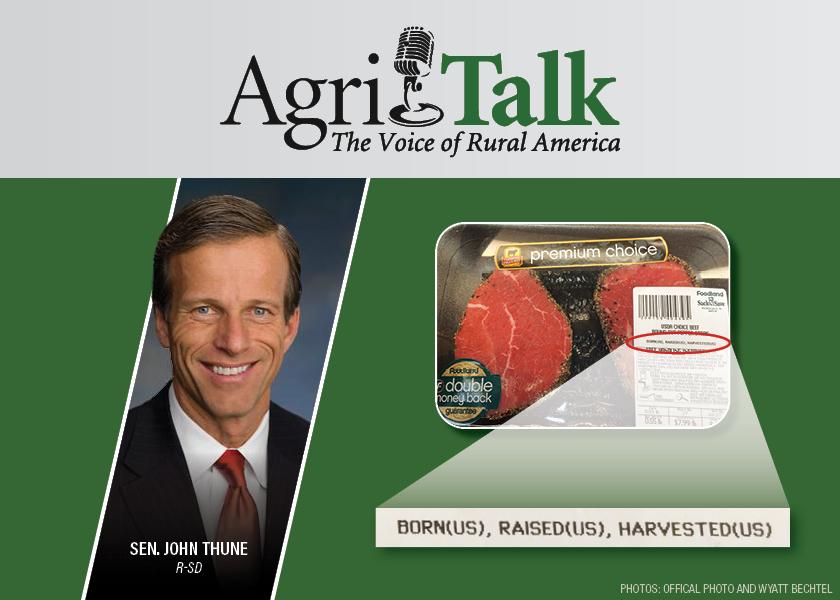Mandatory COOL Discussions Heat Up

On Thursday, Sen. John Thune (R-S.D.) joined Chip Flory, AgriTalk host. The conversation primarily revolved around two initiatives that impact cattle producers – mandatory country of origin labeling (mCOOL) and mandatory price reporting.
First things first, Flory says, the American Beef Labeling Act is not the same as the Product of the USA label. This act is focused on mandatory country of origin labeling.
“Mandatory country of origin labeling is an issue that has been around for a long time. It’s one I’ve been working on since my days in the House of Representatives. In fact, it was included in two previous farm bills, but in every circumstance, it got knocked out by the World Trade Organization, so we had to go back to the drawing board,” Thune says.
The primarily issue with the current beef labeling system is that it allows imported beef that’s finished but not born or raised in the U.S. to be labeled as a product of the U.S.
“Our producers want to be able to have a label that distinguishes their products, which are born, raised and harvested here in the United States, to the consumer — and the consumer, I think, has a right to know,” Thune says. “The shirts you and I are wearing today say where they come from, but the beef we put in the center of our plate doesn’t have to bear that label.”
To get the issue resolved once and for all, Thune says the best way is to get the people who defend it at the World Trade Organization, the U.S. Trade Representative Office and USDA, to be involved in the drafting process. According to Thune, both Katherine Tai, United States Trade Representative, and Tom Vilsack, Secretary of Agriculture, promised at their confirmation hearings to help come up with mCOOL provisions that would withstand or be compliant with World Trade Organization rules.
“Secretary Vilsack gets it; he understands it and we’re trying to get Katherine Tai and others in the administration to share the view that this is an important piece of legislation because it is really important to the economy, the livestock and agricultural economy, in this country,” Thune says. “I hope we'll have good cooperation from the administration, but we’ll see.”
Canada and Mexico are paying careful attention because they contested mCOOL in the past – and they’re the reason why it was repealed, he adds.
“They succeeded in a legal challenge at the World Trade Organization and, as a consequence, the World Trade Organization allowed them to levy retaliatory tariffs against American agriculture, so it was taken off the books,” he explains.
The American Beef Labeling Act is a bipartisan piece of legislation. It’s a first step, Thune describes, with a long road ahead.
“There are other countries with similar labeling laws. The United States, for whatever reason, every time we've tried to do this, we've run into these roadblocks,” he says. “It’s high time we develop a sense of urgency and thread the needle in such a way we can differentiate and under the American Beef Labeling Act allow for transparency that benefits both producers and consumers.”
There’s likely a segment of the cattle industry that wonders why voluntary country of origin labeling hasn’t worked.
“A voluntary law is pretty weak tea,” Thune says. “To ensure consumers know where their beef is coming from, and producers get the benefit of selling the highest quality beef in the world, we have to have a mandatory labelling system.”
Speaking of mandatory, Flory asks, are we going to get an extension for the mandatory price reporting by the end of the month?
“I think what will probably happen, I hope what happens, is we get a yearlong extension at least,” Thune says. “There’s also the possibility we could do a short-term extension. I don’t think we would be opposed to that either. At a minimum, we need to get an extension so when Sept. 30 rolls around that legislation doesn’t cease to exist.”







